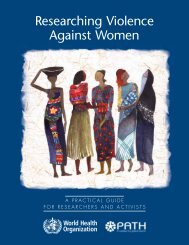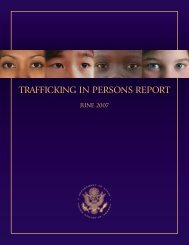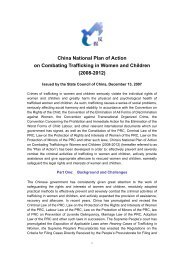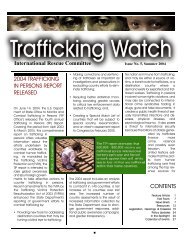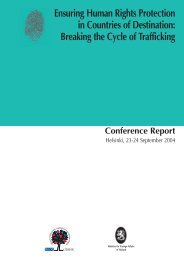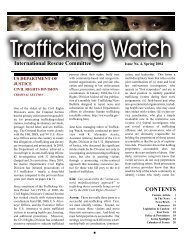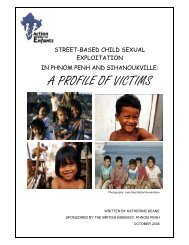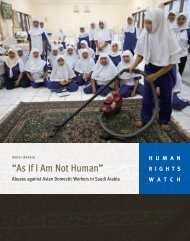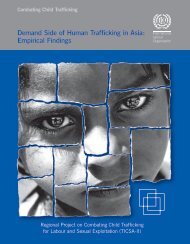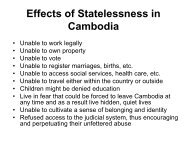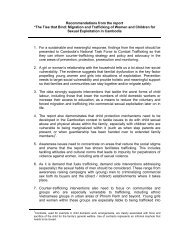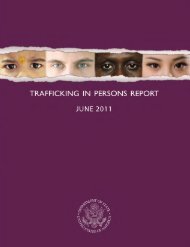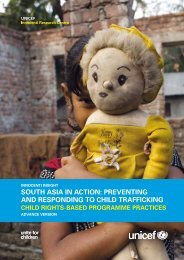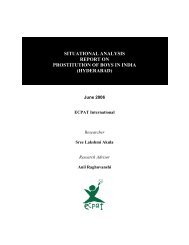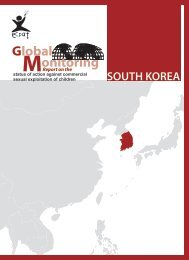Download PDF - Violence Against Children - East Asia and the ...
Download PDF - Violence Against Children - East Asia and the ...
Download PDF - Violence Against Children - East Asia and the ...
Create successful ePaper yourself
Turn your PDF publications into a flip-book with our unique Google optimized e-Paper software.
The Philippines<br />
to detail special concerns which give greater<br />
definition to prohibited acts where <strong>the</strong>re are<br />
child protection issues. For example:<br />
“In addition to all acts defined <strong>and</strong> penalized<br />
under Republic Act 7610 on Child Abuse <strong>and</strong><br />
Exploitation… <strong>the</strong> following acts shall likewise<br />
be punishable:<br />
A. Illegal Recruitment – Any person who<br />
recruits o<strong>the</strong>r persons for work shall be required<br />
to register <strong>and</strong> secure a permit… with an<br />
undertaking not to recruit children.<br />
There is a presumption of illegal trafficking<br />
when a person is found toge<strong>the</strong>r with three or<br />
more minors not his or her relative at <strong>the</strong> pier<br />
or port of exit for <strong>the</strong> purpose of transporting<br />
<strong>the</strong> minors to ano<strong>the</strong>r place without any permit<br />
from <strong>the</strong> council captain.”<br />
The Code includes mechanisms known as<br />
Local Councils for <strong>the</strong> Welfare of <strong>Children</strong> to<br />
coordinate implementation of all policies,<br />
programs <strong>and</strong> projects relative to <strong>the</strong><br />
survival, development <strong>and</strong> protection of<br />
children. These will be monitored by a<br />
Provincial Council, which will have a<br />
membership of 21 including three<br />
representatives from NGOs; one child;<br />
government departments; <strong>the</strong> provincial<br />
attorney; <strong>and</strong> a representative of <strong>the</strong> business<br />
sector. The Provincial Council will create a<br />
desk for children’s concerns, which will assist<br />
local government when it creates policy that<br />
may affect children. The children’s desk will<br />
provide child impact statements on <strong>the</strong> likely<br />
repercussions of proposed legislation or<br />
policy on children <strong>and</strong> assist <strong>the</strong> Philippines<br />
Government to provide its CRC<br />
implementation reports to <strong>the</strong> United<br />
Nations.<br />
The Code includes provision for remedy<br />
<strong>and</strong> penalties where unlawful acts have been<br />
committed against a child. This includes<br />
m<strong>and</strong>atory reporting for doctors, hospitals<br />
<strong>and</strong> government workers, <strong>and</strong> provisions for<br />
failure to report.<br />
The Code has 114 sections, is 35 pages<br />
long, <strong>and</strong> was approved by <strong>the</strong> Bohol<br />
Governor in November 2000. The initiative<br />
has been shared with o<strong>the</strong>r provincial<br />
authorities, <strong>and</strong> has so far been taken up by<br />
three o<strong>the</strong>rs.<br />
The <strong>Children</strong>’s Code is a valuable local<br />
resource that enhances child development <strong>and</strong><br />
protection by providing framework that makes<br />
it everyone’s job to consider <strong>the</strong> best interests<br />
of <strong>the</strong> child. Lessons can be learned from <strong>the</strong><br />
process as well as <strong>the</strong> outcome.<br />
Community organising can be more<br />
effective than casework<br />
Work in partnership <strong>and</strong> coalitions, where<br />
<strong>the</strong>re is opportunity, can maximise results<br />
<strong>and</strong> avoid duplication. Civil society networks<br />
or bodies, such as <strong>the</strong> church, can be a<br />
resource in running value-formation courses<br />
with <strong>the</strong> community. World Vision seeks to<br />
involve <strong>the</strong>m as partners to advocate with<br />
local authorities on issues of child labour (e.g.<br />
on sugar plantations or deep-sea fishing in<br />
Negros – see text box on a later page), or<br />
children not going to school.<br />
Demonstrated examples of good practice in<br />
community organising <strong>and</strong> cooperation<br />
between NGOs in <strong>the</strong> interests of children are<br />
evident in Palawan. The “PIGLAS” (Pinag-isang<br />
Lakas Alay sa Kabataan – United Force for<br />
<strong>Children</strong>) network, also known as <strong>the</strong><br />
Provincial Taskforce on Child Labour in<br />
Palawan, has 22 organisations as members <strong>and</strong><br />
a principal aim of addressing <strong>the</strong> issue of child<br />
labour. The 22 members, including national <strong>and</strong><br />
local government departments, International<br />
Organisations, NGOs <strong>and</strong> people’s<br />
organisations, each bring areas of expertise <strong>and</strong><br />
efforts are made to avoid duplication.<br />
The network engages government in<br />
planning <strong>the</strong> provision of children/youth<br />
services. It is unified <strong>and</strong> has a collective<br />
strategy to take action on child protection<br />
issues such as child labour. It is in <strong>the</strong> process<br />
of being registered as a legal entity, which will<br />
61



